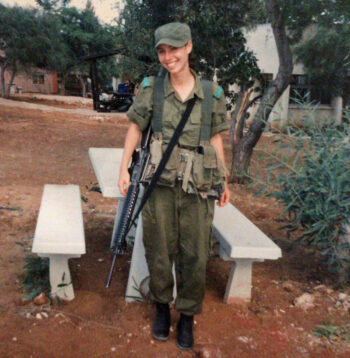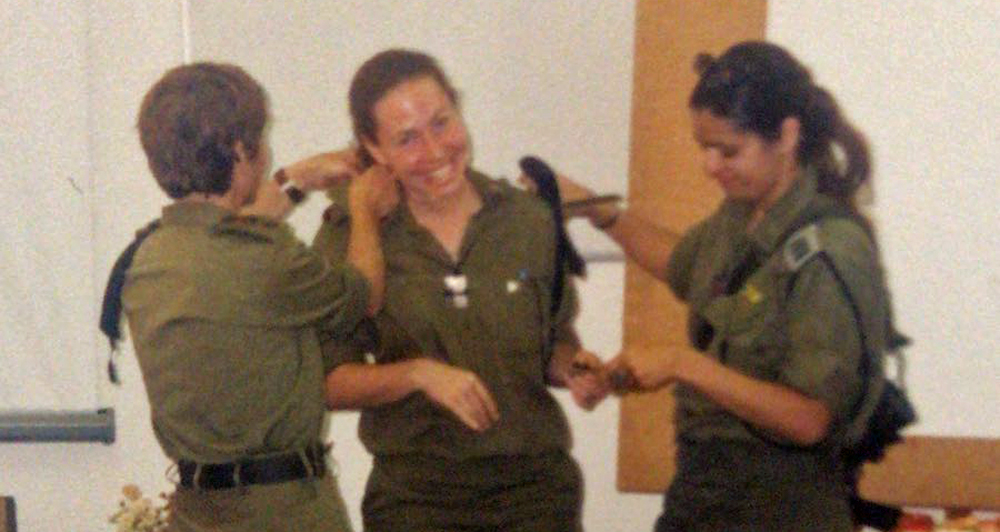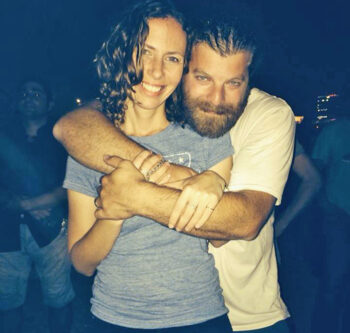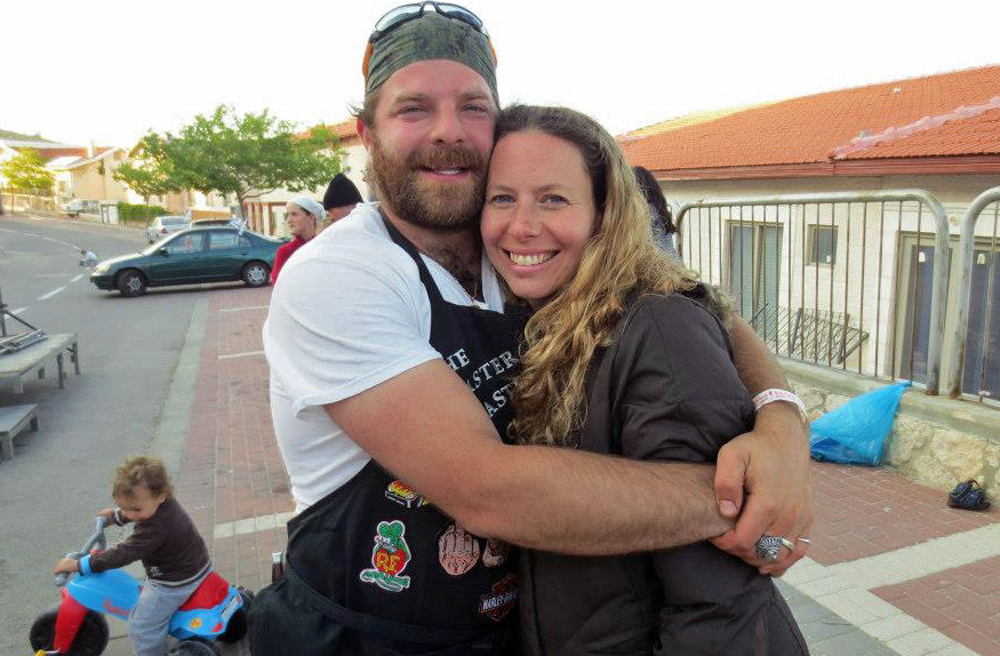By Mark Ellis –

At her high school graduation in Highland Park, New Jersey, school administrators acknowledged the impressive list of colleges many of her fellow students would be attending in the fall.
Then they got to Keren Claster and announced she would be going into the Israeli Defense Forces (IDF).
“I didn’t know anyone else doing that,” she admits.
Like many sitting in the crowd of people assembled for the graduation, Keren’s parents had been surprised to learn of her intentions. “What?” they exclaimed.
“But this is everything you taught me,” she replied. As the granddaughter of holocaust survivors who were among the first Zionist settlers in Israel, Keren grew up in a thoroughly Jewish household.
Her parents moved from Israel to New Jersey when Keren was four-years-old, seeking career opportunities. “My house was very Israeli, the food, culture, language. My parents still can’t speak English that well. They held on to their Israeli identity even though they have been in the U.S. for 30 years,” she notes.
Her parents were both born in Israel. “Both had a difficult childhood,” she notes, “that whole generation did — growing up in households with people that fled or were survivors (of the holocaust). Some survivors lived life to the fullest and were happy. Others were bitter, could show no emotion, were very difficult and hard.”
While her mother’s family was secular, her father’s family was very religious. Despite their difference they fell in love, but shared other commonalities. “Both my parents are very Zionistic. Survival is a big word that I relate to in my childhood.”
Two weeks after her high school graduation Keren moved to Israel. “I always knew growing up that I would go and serve in the army,” she says. “I felt that since there is a Jewish state and it is serving me as well, I have a responsibility like any other 18 year old in Israel to serve the state.”
After a week in Israel she started basic training and immediately experienced culture shock. While she spoke Hebrew growing up in her family home, “it was far from being proficient for what I was demanded to do. I remember crying a lot in the beginning,” she recalls.

After basic training she became a class commander, then decided to go into an officer’s training program. She was the youngest in her class. In addition to the physical and emotional demands, she had to master military studies. “I would stay up all night studying the material,” she says.
A few years into her service, the army decided to de-segregate men and women and Keren was among the first.
She became a platoon commander in officer’s training, with four classes and four class commanders under her. Then she advanced to become a deputy company commander, with four platoons and 16 classes she oversaw.
It was a major challenge at every turn. “Everything in the army pushes you one step further past what you think is possible for yourself,” she says.
I remember having moments to look at myself from the side and thought, I can’t believe I’m in Israel training the next generation of officers…getting chills and appreciating the moment.”
One of her major challenges as a company commander was dealing with male immigrants from the former Soviet Union after they entered basic training. “Most had been in the Red Army and came with that baggage,” she notes. Most didn’t know the language and had been there only a few months.”
“You can’t imagine the things I dealt with…some were life threatening at points.”
One day a few Bedouin soldiers of the IDF had words with some of the former Soviets in the IDF. “It broke into this huge fight and I found myself standing between 150 soldiers from the former Soviet Union who were my soldiers and these three Bedouins. Everyone had guns. It was scary.” To her credit, Keren was able to defuse the crisis by standing in the gap.

Keren met her future husband, Erik, in the streets of Jerusalem on a night they both had off, “just by chance.” They soon discovered they had moved to Jerusalem one month apart from each other.
Erik, a fifth generation Jewish American, grew up in Kansas City, Kansas. “His family was not observant,” she notes. “Somehow at 13 he decided to become observant.
“He’s a very strong person who knows what he wants. At 18 he came to Israel without knowing anyone or anything, and went to live in an all-Israeli Yeshiva, where you’re immersed in Bible studies. He lived there for a year and studied the Bible intensely. He was the only English speaker, and he knew no Hebrew. That’s how he quickly immersed himself in Israeli society.”
Then Erik joined the army. “He was in a foot soldier platoon in Gaza when things were intense there. He was in battle almost every day.”
The same day Keren earned the rank of captain, Erik proposed to her. They only spent about five hours together before their marriage because they were in service the entire time. “When I would speak to him on the phone I would hear gunshots all the time. It was intense. He was deep in Gaza.”
When Keren first arrived in Israel, she thought she would complete her time in the army and then return to the U.S., but during her service, her heart began to change.
“At this point I realized I didn’t want to go back to America. I realized this is where I really want to be and I really fell in love with the army. I could see myself staying in forever, but thought I had a responsibility to at least try civilian life.”
She took a sabbatical that was supposed to last a year. “We got engaged and married pretty quickly, in 2004. When he started his officer training I started my sabbatical.”
Only a month after they married, Erik was part of the group that discovered the tunnels in Gaza. While Keren was riding on a bus she heard the news that his unit was in a big battle and a few soldiers were killed.
“I tried to reach him and I couldn’t reach him. There was no cell service where he was. That was the longest 20 hours, really frightening.” Thankfully, Erik was not one of the casualties that day.
“At some point we decided he would leave the army and I left. We wanted to experience civilian life in Israel.”
Keren and Erik have five children and live in Efrat, a settlement located outside Jerusalem near Bethlehem. “Efrat is considered over the green line,” she notes. “There is a checkpoint I go through when I go to work every day.”

She previously worked for the Jewish Agency for Israel (JAFI), where she felt she could continue to serve her adopted country. Currently, she works for the International Fellowship for Christians and Jews (IFCJ).
She also harbors political aspirations to become a member of the Knesset one day.
“Israel is like a kid who has grown up and has to realize it has grown up,” she observes. “Being 70 puts you in a different place than when you are younger. We have to mature into our next stage of being a state.
“A lot of media still has to do with survival and security. I’m not blind to this issue. Conveniently, we immerse ourselves in that instead of dealing with cultural and sociological and educational issues within the country. That is our next level.”
“Israel has definitely established itself; we are strong in terms of security and resilience. We need to deal with internal issues and not always be focused 100 percent on security issues.”
Keren, now 37, has become involved in establishing a new political movement that shares her views about this next stage for Israel. The movement includes a diverse coalition of secular and religious, ultra-Orthodox, left and right, Israeli Arabs, Druze, young and old.
“We are coming together with a willingness to work things out,” she says. “It is not compromising. It is working together to create new solutions.”
Keren is thankful for the support for Israel shown by evangelical Christians in the U.S. During the last war, when missiles were being shot from Gaza every day, her kids asked, “Why does everyone hate us?”
“I was thankful to be able to share with them that not everyone hates the Jews. There is a strong, huge community (of Christians in the U.S.) that doesn’t even know you and they love you and they care for you and they support us from afar.
“I thank you and I have a really special place in my heart for the evangelical community.”
In her free time, Keren likes to read about religion. “I think our time in Israel now is the beginning of redemption toward the Third Temple,” she says. “I can’t separate Zionism and religion; they are one to me. Jews are able to come from all over the world to their homeland. I see this as our opportunity to start this process of the beginning of redemption.”
Keren believes the coming Messiah could be a long way from now. “There is a lot of work we have to do to get to that Third Temple and Messiah,” she says.
“I believe the Third Temple will be built, but it is probably a ways off. Something is happening. I can feel something is happening. I read about the Messiah and the Third Temple a lot. It is unclear if it is an actual physical state or more of a spiritual era and time we will be in, immersed in something different than what we know today. I don’t know if Messiah is a person. It is too big for me to grasp,” she says.
Keren respects the place of Jesus in history, religion, and the culture of western civilization.
“I want to find a way to combine everything, like religion, politics and art. For me, inside my soul they are all one. Somehow when you meet reality there is politics, religion, art, and I’m still trying to see how reality can meet what is happening inside me.”



